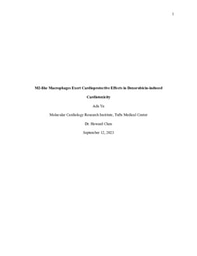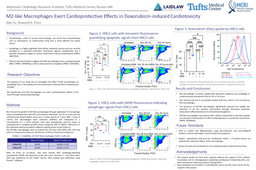Project Outline: The Interplay of Autophagy and Inflammation
The Effect of M2-like Macrophages on Autophagic Flux and Cardiac Function in Doxorubicin-Treated Mice
Supervised by Dr. Howard Chen, Molecular Cardiology Research Institute at Tufts Medical Center, Boston
Project Background
Autophagy and inflammation are two incredibly important processes in the body. Autophagy, in brief, is an intracellular degradation system that allows for the elimination and recycling of macromolecules, damaged organelles, misfolded or aggregated proteins, and/or intracellular pathogens. Evidently, autophagy is crucial for the maintenance, repair, and survival of cells. Interestingly enough, recent research has shown that autophagy could also potentially play a role in protecting the heart from anthracyclines, which are a powerful class of drugs used in cancer chemotherapy and are often used to treat a variety of cancers, such as leukemias, lymphomas, breast, stomach, uterine, ovarian, bladder cancer, and lung cancers.
Doxorubicin is a type of anthracycline drug and is considered to be one of the strongest chemotherapy drugs for breast cancer. Unfortunately, one of the largest side effects of anthracyclines, including Doxorubicin, is severe damage to the heart and/or cardiovascular system, which is often referred to as cardiotoxicity. Cardiotoxicity can happen during cancer treatment, but more often, it occurs months, if not years, after cancer treatment. This duration of onset, combined with limited understanding and a lack of proper screening tools, results in cardiac issues as the leading cause of death of cancer survivors.
While these are grim facts, there is still hope. As mentioned before, new studies have shown that autophagy could potentially play a role in protecting the heart from damage during anthracycline chemotherapy. But it is important to mention that this is still a very new field. With autophagy only becoming a topic of interest in the scientific community in the last 10 years, there are still a plethora of unanswered questions about its protective role in cardiotoxicity, and Dr. Chen’s lab is just one of many trying to determine the answers.
Research Question and Methodology
Recent work has shown that there is a strong connection between autophagy and the immune system, with autophagy contributing to both innate and adaptive immunity as a regulator and effector. However, the link still remains unclear. My independent project analyzes how M2 macrophages, a key component of the immune system involved in anti-inflammatory responses, contribute to the level of autophagy and resulting cardiotoxicity in Doxorubicin-treated tumor mice. My project builds on a previous study conducted by Liu et al. showing that an adoptive transfer of M2-like macrophages significantly improved cardiac function in Doxorubicin-induced heart failure in mice by the macrophages’ ability to transfer their mitochondria to the injured cardiomyocytes. While similar, my project adopts a different protocol with different experimental groups and different factors to analyze. The most pertinent difference between my study and the original paper is that, by using mice implanted with tumors and observing autophagic flux, I will be able to observe the direct interaction of M2 macrophages and autophagy in a cancer setting.
Impact
Because the field of autophagy is still relatively new, I hope that my project can answer some questions that have yet to be answered, while also inspiring new questions. Depending on the results of my project, I would like to continue exploring this topic and better understand how inflammation and autophagy can work together to either improve or worsen cardiotoxicity. Hopefully, my work could also contribute to developing new screening tools to help both \drug development companies and physicians identify early signs of cardiotoxicity in patients which will improve the livelihood and wellbeing of cancer patients worldwide.


Please sign in
If you are a registered user on Laidlaw Scholars Network, please sign in